Saturday, April 05, 2008
Our Blessed Lady's Saturday
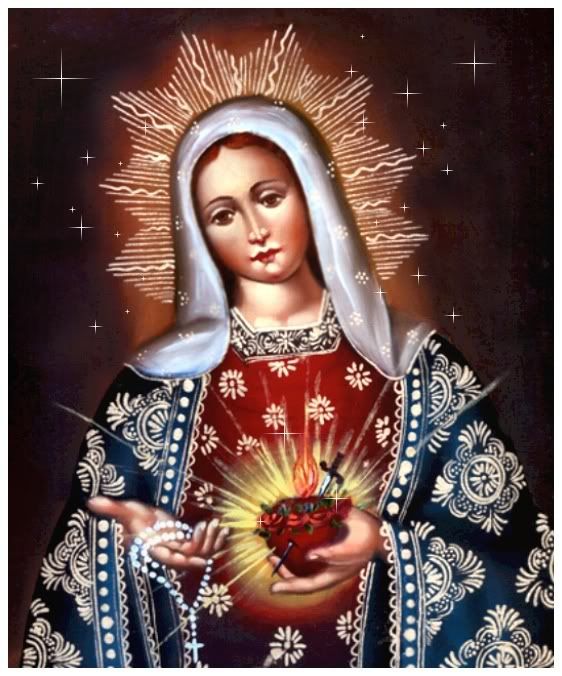
ACT OF REPARATION
To be recited on the First Saturdays, but one may do so at any time.
Most Holy Virgin
and our beloved Mother,
we listen with grief
to the complaints of thy Immaculate Heart, /
surrounded with the thorns /
which ungrateful men place therein /
at every moment /
by their blasphemies and ingratitude. /
Moved by the ardent desire /
of loving thee as our Mother /
and of promoting a true devotion /
to thy Immaculate Heart, /
we prostrate ourselves at thy feet /
to prove the sorrow we feel /
for the grief that men cause thee /
and to atone by means of /
our prayers and sacrifices /
for the offenses with which men /
return thy tender love.
Obtain for them /
and for us /
the pardon of so many sins. /
A word from thee /
will obtain grace and forgiveness for us all. /
Hasten, O Lady, /
the conversion of sinners /
that they may love Jesus /
and cease to offend God, /
already so much offended, /
and thus avoid eternal punishment. /
Turn thine eyes of mercy /
towards us / so that henceforth /
we may love God with all-our heart /
while on earth /
and enjoy Him forever in Heaven. /
Amen.
ACT OF CONSECRATION
to the Immaculate Heart of Mary
For Parishes, Families, and Individuals.
O IMMACULATE HEART OF MARY, /
Queen of Heaven and earth /
and tender Mother of men, /
in accordance with thy ardent wish /
made known at Fatima /
I consecrate to thee myself, /
my brethren, /
my country /
and the whole human race. /
Reign over us /
and teach us how to make /
the Heart of Jesus reign and triumph /
in us and around us /
as It has reigned and triumphed in thee. /
Reign over us, dearest Mother, /
that we may be thine /
in prosperity and in adversity, /
in joy and in sorrow, /
in health and in sickness, /
in life and in death. /
O most compassionate Heart of Mary, /
Queen of Virgins, /
watch over our minds and hearts /
and preserve them /
from the deluge of impurity /
which thou didst lament /
so sorrowfully at Fatima. /
We want to be pure like thee. /
We want to atone for the many sins committed /
against Jesus and thee. /
We want to call down /
upon our country and the whole world /
the peace of God /
in justice and charity. /
Therefore, we now promise /
to imitate thy virtues /
by the practice of a Christian life /
without regard to human respect. /
We resolve to receive Holy Communion /
on the first Saturday of every month /
and to offer thee five decades /
of the Rosary each day /
together with our sacrifices /
in a spirit of reparation and penance. /
Amen.
Labels: Restorationists
Friday, April 04, 2008
Friday At the Foot Of the Cross
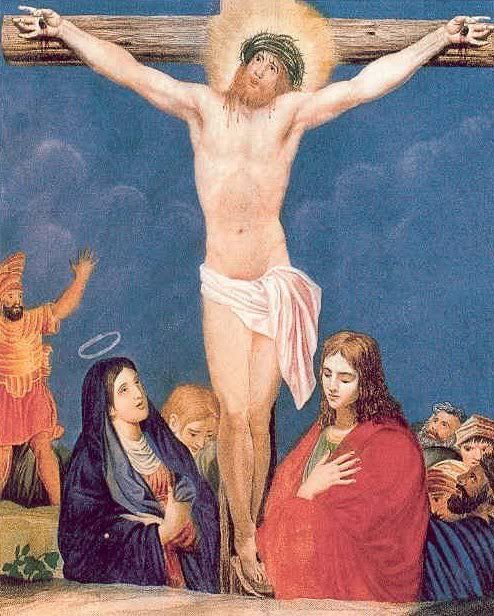
Act of Contrition to the Sacred Heart
O most Sacred and adorable Heart of Jesus, behold me humbly prostrate before Thee with a heart contrite and penetrated with lively sorrow for having loved Thee so little and for having offered Thee so many insults by my wandering from Thee, by my ingratitude, my perfidy and my other acts of infidelity, by which I have rendered myself unworthy of Thy mercies and of all the graces and favors of Thy pure love.
The shame and regret which I feel leave me no other words to express myself except to say: I have sinned against Thee. Have pity on me who am unworthy of all mercy. Do not condemn me, however, O Divine Heart, full of charity. I implore Thee to manifest the excess of Thy goodness by showing favor to this poor criminal who appears before Thee annihilated in the abyss of her nothingness and misery. Alas! O Sacred Heart, I have sinned against Thee, do not abandon me to the rigor of Thy justice which would infallibly punish any want of love towards Thee by the eternal privation of Thy love. Oh! rather let all torments, pains and miseries come and overwhelm me, than that I should be deprived for a moment of loving Thee! And since it is Thou, O Divine Heart of Jesus, the Source of love, who hast received the insults of all my infidelities and of my want of love, do Thou take care to be avenged upon me. If Thou wishest to condemn me to burn eternally, I consent, provided it be in the devouring fire of Thy pure love. O compassionate Heart, save me by the excess of Thy mercy. Do not allow me to perish in the deluge of my iniquities. O Heart of love, I cry to Thee from the abyss of my misery; save me by Thy ardent charity. Save me, I implore Thee, by all that is in Thee most capable of moving Thee to do me this great mercy. Have pity, then, on this poor criminal who expects her salvation from Thee.
Oh! save me, O merciful Heart, at whatever price it may cost. Save me and do not deprive me of loving Thee eternally. Rather let all the moments of life that remain to me be filled with bitterness, sorrow and affliction.
Am I not sufficiently punished for having loved so late a Heart so full of love! But because I love Thee, I have such regret for having so ungratefully offended Thee, my Sovereign Good, that rather than having committed so many sins, I would wish from the moment I commenced to sin to have endured as a preservative all the pains of Hell, although I hope that in Thy love Thou wilt exempt me from them. This is what I pray Thee, while crying to Thee with all my heart for mercy. Pardon, then, in Thy mercy, this afflicted heart which has put all its confidence and all its hope in Thee.
O Heart of Jesus, my Savior, exercise over me this office which has cost Thee so dear and do not lose the fruit of so many sufferings and of so painful a death, but honor it by saving me in order that my heart may adore, praise and glorify Thee eternally. Be then, O Sacred Heart, our refuge and our hope, now and at the hour of our death!
Take my cause in hand, justify me and turn away the rigors which my sins have merited. Thou art my true friend, do Thou answer and satisfy for me. Draw me from the abyss into which my sins have precipitated me. Hearken to the groans of my afflicted heart which hopes for everything from Thy goodness. But if Thy justice condemns it as unworthy of pardon, it will appeal to the tribunal of Thy love, being ready to suffer all its rigors rather than be for a single moment deprived of loving Thee. Cut, burn, amputate; provided only I love Thee, it is sufficient for me. Spare neither my body nor my life, whenever there is question of Thy glory. I belong to Thee, O Divine and Adorable Heart, work out, then, my salvation, I implore Thee. In punishing my sins, do not abandon me to myself, allowing me to relapse into the same sins. Ah! rather a thousand deaths than offend Thee whom I love a hundred times more than my life!
What glory will the loss of a wretched grain of dust give Thee? And Thou shalt have great glory in saving such a miserable sinner. Save me, then, O pure Love, for I wish to love Thee eternally whatever price it may cost me. Yes, I wish to love Thee whatever it may cost me, I wish to love Thee with my whole heart.
Amen.
Labels: Restorationists
Thursday, April 03, 2008
Where They Belong
Yesterday's victory over the Oakland A's in Oakland, sweeping the two-game series, put the Red Sox atop the American League Eastern Division, at 3-1. Lester looked good, as did Dice-K in the series opener. The problem with both has been consistency, so let us see if they can keep it up.
Labels: Boston Red Sox
Just Because It Is April
And spring is in the air, and that old familiar itch is there again.
A few YouTube snippets from Waterloo, Zulu, The Patriot, Sharpe, Horatio Hornblower, and reenactment videos, with some reenactment stills and some 18th century song lyrics.
Barbara Allen
In Scarlet town where I was born,
There was a fair maid dwellin'
Made every youth cry Well-a-day,
Her name was Barb'ra Allen.
All in the merry month of May,
When green buds they were swellin'
Young Willie Grove on his death-bed lay,
For love of Barb'ra Allen.
He sent his servant to her door
To the town where he was dwellin'
Haste ye come, to my master's call,
If your name be be Barb'ra Allen.
So slowly, slowly got she up,
And slowly she drew nigh him,
And all she said when there she came:
"Young man, I think you're dying!"
He turned his face unto the wall
And death was drawing nigh him.
Good bye, Good bye to dear friends all,
Be kind to Bar'bra Allen
When he was dead and laid in grave,
She heard the death bell knelling.
And every note, did seem to say
Oh, cruel Barb'ra Allen
"Oh mother, mother, make my bed
Make it soft and narrow
Sweet William died, for love of me,
And I shall of sorrow."
They buried her in the old churchyard
Sweet William's grave was neigh hers
And from his grave grew a red, red rose
From hers a cruel briar.
They grew and grew up the old church spire
Until they could grow no higher
And there they twined, in a true love knot,
The red, red rose and the briar.
Midi Format

Fathom The Bowl
I'll fathom the bowl, I'll fathom the bowl
Give me the punch ladle, I'll fathom the bowl
Come all you bold heroes, give an ear to my song
And well sing in the praise of good brandy and rum
There's a clear crystal fountain near England shall roll
Give me the punch ladle, I'll fathom the bowl
From France we do get brandy, from Jamaica comes rum
Sweet oranges and apples from Portugal come
But stout and strong cider are England's control
Give me the punch ladle, I'll fathom the bowl
My wife she do disturb me when I'm laid at my ease
She does as she likes and she says as she please
My wife, she's a devil, she's black as the coal
Give me the punch ladle, I'll fathom the bowl
My father he do lie in the depths of the sea
With no stone at his head but what matters for he
There's a clear crystal fountain, near England shall roll
Give me the punch ladle, I'll fathom the bowl
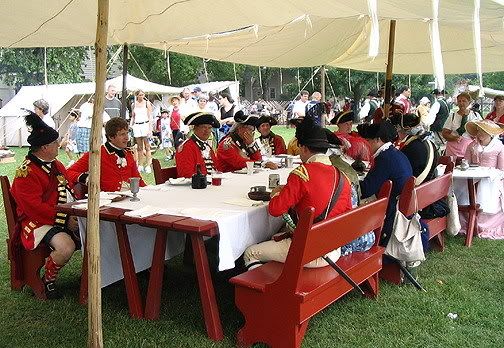
Men Of Harlech
Fierce the beacon's light is flaming
With its tongues of fire proclaiming
Chieftains, sundered to your shaming
Strongly now unite
At her call, all Arfon rallies
War cries rend her hills and vallies
Troop on troop, with headlong sallies
Hurtle to the fight
Chiefs lie dead and wounded.
Yet, where first was grounded,
Freedom's flag still holds the crag;
Her trumpet still is sounded.
There we'll keep her banner flying,
While the pale lips of the dying
Echo to our shouts defying
HARLECH for the right!
Shall the Saxon army shake you
Smite, pursue and overtake you?
Men of Harlech, God will make you
Victors, blow for blow.
The swollen rivers of Eryri
Sweep the vale with flooded fury
Gwalia from her mountain eryie
Thunders on the foe.
Now avenging Briton,
Smite as he has smitten
Let your rage on history's page
In Saxon blood be written.
His lance is long, but yours is longer.
Strong his sword, but yours is stronger.
One stroke more, and now your wronger
At your feet, lies low.
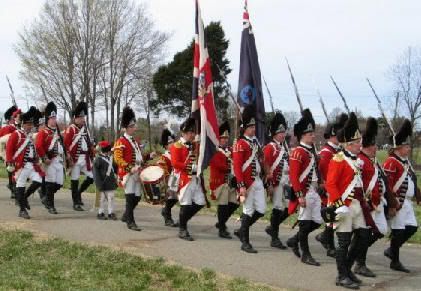
Oh Dear, What Can the Matter Be?
Dear, dear, what can the matter be?(3x)
Johnny's so long at the fair.
He promised he'd buy me a basket of posies,
A garland of lilies a wreath of red roses,
He promised he'd bring me a bunch of blue ribbons,
To tie up my bonnie brown hair.
And it's oh, dear, what can the matter be?
Dear, dear, what can the matter be,
Oh dear, what can the matter be?
Johnny's so long at the fair.
He promised he'd buy me a beautiful fairing,
A gay bit of lace that the lassies are wearing,
A little straw hat to set off the blue ribbons
That tie up my bonnie brown hair.
(repeat chorus)
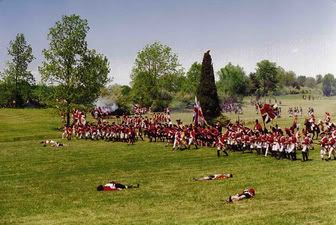
The British Light Infantry
For battle prepared in their country's just cause,
Their King to avenge and support all his laws;
As fierce as the tyger, as swift as the roe,
The British Light Infantry rush on their foe.
Though rebels unnumber'd oppose their career,
Their hearts are undaunted, they're strangers to fear;
No obstacles hinder, relentless they go,
And death and destruction attend every blow.
'Cross the deep-gullied vale, up the mountain's steep side,
Through the rough foaming river's impetuous tide,
O'er the fortified redoubt, close wedged in array,
Regardless of safety they follow their prey.
The alarm of the drum and the cannon's loud roar,
The musket's quick flash but inflames them the more.
No dangers dismay, for they fear no control,
But glory and conquest inspires every soul.
Whenever the foe stands arranged in their sight,
With ardour impatient they pant for the fight.
Rout, havock, confusion - they spread through the field,
And rebellion and treason are forced to yield.

Johnny's Gone For a Soldier
Here I sit on Buttermilk Hill
Who can blame me, cryin' my fill
And ev'ry tear would turn a mill,
Johnny has gone for a soldier.
Me, oh my, I loved him so,
Broke my heart to see him go,
And only time will heal my woe,
Johnny has gone for a soldier.
I'll sell my rod, I'll sell my reel,
Likewise I'll sell my spinning wheel,
And buy my love a sword of steel,
Johnny has gone for a soldier.
I'll dye my dress, I'll dye it red,
And through the streets I'll beg for bread,
For the lad that I love from me has fled,
Johnny has gone for a soldier.
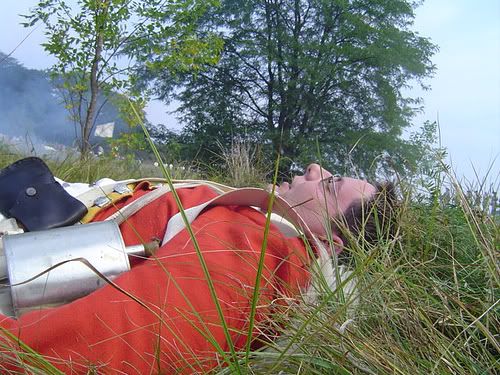
The British Grenadiers
Some talk of Alexander, and some of Hercules,
Of Hector and Lysander, and some of Meltiades.
But of all the world's brave heros, there's none that can compare
With a tow row row row row
To the British grenadiers
Now none of these ancient heros ever saw a cannon ball
Or knew the force of powder to slay their foes withal,
But our brave boys do now them and banish all their fears
With a tow row row row row
To the British grenadiers
Whenever we are commanded to storm the palisades
Our leaders march with fusils and we with hand grenades
We hurl them from the glacis, about our enemies' ears
With a tow row row row row
To the British grenadiers
The God of War was pleased and great Bellona smiles
To see these noble heroes of our British Isles
And all the Gods celestial, descending from their spheres,
Beheld with adoration
The British grenadiers
Now let us crown a bumper and drink a health to those,
Who carry caps and pouches and wear the loup'ed
clothes
May they and their commanders live happy all their years
With a tow row row row row
To the British grenadiers
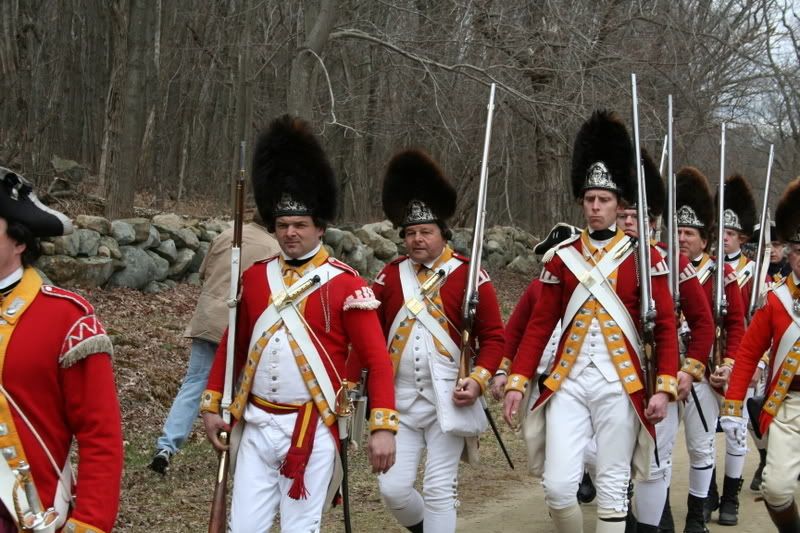
The Lincolnshire Poacher
When I was bound apprentice in famous Lincolnshire,
Full well I served my master for more than seven years,
Till I took up to poaching, as you shall quickly hear,
Oh, 'tis my delight on a shiny night in the season of the year.
As me and my companions were setting of a snare,
'Twas then we spied the gamekeeper, for him we did not care,
Far we can wrestle and fight, my boys and jump out anywhere,
Oh, 'tis my delight on a shiny night in the season of the year.
As me and my companions were setting four or five,
And taking on 'em up again, we caught a hare alive.
We took a hare alive my boys, and through the woods did steer
Oh, 'tis my delight on a shiny night in the season of the year.
I threw him on my shoulder and then we trudged home
We took him to a neighbour's house, and sold him for a crown;
We sold him for a crown, my boys, but I did not tell you where
Oh, 'tis my delight on a shiny night in the season of the year.
Success to ev'ry gentleman that lives in Lincolnshire
Success to every poacher that wants to sell a hare
Bad luck to ev'ry gamekeeper that will not sell his deer
Oh, 'tis my delight on a shiny night in the season of the year.
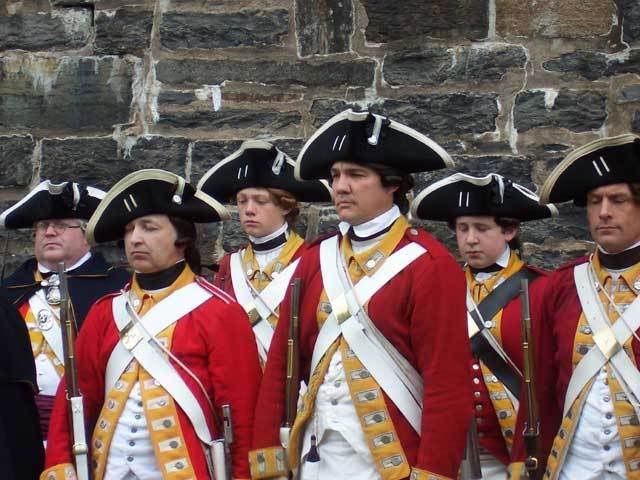
Over the Hills and Far Away
Our 'prentice Tom may now refuse
To wipe his scoundrel Master's Shoes,
For now he's free to sing and play
Over the Hills and far away.
Chorus:
Over the Hills and O'er the Main,
To Flanders, Portugal and Spain,
King George commands and we'll obey
Over the Hills and far away.
We all shall lead more happy lives
By getting rid of brats and wives
That scold and bawl both night and day -
Over the Hills and far away.
Chorus
Courage, boys, 'tis one to ten,
But we return all gentlemen
All gentlemen as well as they,
Over the hills and far away.
Chorus
Midi Format
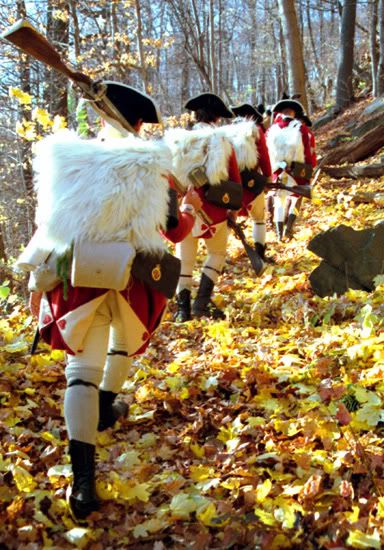
A few YouTube snippets from Waterloo, Zulu, The Patriot, Sharpe, Horatio Hornblower, and reenactment videos, with some reenactment stills and some 18th century song lyrics.
Barbara Allen
In Scarlet town where I was born,
There was a fair maid dwellin'
Made every youth cry Well-a-day,
Her name was Barb'ra Allen.
All in the merry month of May,
When green buds they were swellin'
Young Willie Grove on his death-bed lay,
For love of Barb'ra Allen.
He sent his servant to her door
To the town where he was dwellin'
Haste ye come, to my master's call,
If your name be be Barb'ra Allen.
So slowly, slowly got she up,
And slowly she drew nigh him,
And all she said when there she came:
"Young man, I think you're dying!"
He turned his face unto the wall
And death was drawing nigh him.
Good bye, Good bye to dear friends all,
Be kind to Bar'bra Allen
When he was dead and laid in grave,
She heard the death bell knelling.
And every note, did seem to say
Oh, cruel Barb'ra Allen
"Oh mother, mother, make my bed
Make it soft and narrow
Sweet William died, for love of me,
And I shall of sorrow."
They buried her in the old churchyard
Sweet William's grave was neigh hers
And from his grave grew a red, red rose
From hers a cruel briar.
They grew and grew up the old church spire
Until they could grow no higher
And there they twined, in a true love knot,
The red, red rose and the briar.
Midi Format

Fathom The Bowl
I'll fathom the bowl, I'll fathom the bowl
Give me the punch ladle, I'll fathom the bowl
Come all you bold heroes, give an ear to my song
And well sing in the praise of good brandy and rum
There's a clear crystal fountain near England shall roll
Give me the punch ladle, I'll fathom the bowl
From France we do get brandy, from Jamaica comes rum
Sweet oranges and apples from Portugal come
But stout and strong cider are England's control
Give me the punch ladle, I'll fathom the bowl
My wife she do disturb me when I'm laid at my ease
She does as she likes and she says as she please
My wife, she's a devil, she's black as the coal
Give me the punch ladle, I'll fathom the bowl
My father he do lie in the depths of the sea
With no stone at his head but what matters for he
There's a clear crystal fountain, near England shall roll
Give me the punch ladle, I'll fathom the bowl

Men Of Harlech
Fierce the beacon's light is flaming
With its tongues of fire proclaiming
Chieftains, sundered to your shaming
Strongly now unite
At her call, all Arfon rallies
War cries rend her hills and vallies
Troop on troop, with headlong sallies
Hurtle to the fight
Chiefs lie dead and wounded.
Yet, where first was grounded,
Freedom's flag still holds the crag;
Her trumpet still is sounded.
There we'll keep her banner flying,
While the pale lips of the dying
Echo to our shouts defying
HARLECH for the right!
Shall the Saxon army shake you
Smite, pursue and overtake you?
Men of Harlech, God will make you
Victors, blow for blow.
The swollen rivers of Eryri
Sweep the vale with flooded fury
Gwalia from her mountain eryie
Thunders on the foe.
Now avenging Briton,
Smite as he has smitten
Let your rage on history's page
In Saxon blood be written.
His lance is long, but yours is longer.
Strong his sword, but yours is stronger.
One stroke more, and now your wronger
At your feet, lies low.

Oh Dear, What Can the Matter Be?
Dear, dear, what can the matter be?(3x)
Johnny's so long at the fair.
He promised he'd buy me a basket of posies,
A garland of lilies a wreath of red roses,
He promised he'd bring me a bunch of blue ribbons,
To tie up my bonnie brown hair.
And it's oh, dear, what can the matter be?
Dear, dear, what can the matter be,
Oh dear, what can the matter be?
Johnny's so long at the fair.
He promised he'd buy me a beautiful fairing,
A gay bit of lace that the lassies are wearing,
A little straw hat to set off the blue ribbons
That tie up my bonnie brown hair.
(repeat chorus)

The British Light Infantry
For battle prepared in their country's just cause,
Their King to avenge and support all his laws;
As fierce as the tyger, as swift as the roe,
The British Light Infantry rush on their foe.
Though rebels unnumber'd oppose their career,
Their hearts are undaunted, they're strangers to fear;
No obstacles hinder, relentless they go,
And death and destruction attend every blow.
'Cross the deep-gullied vale, up the mountain's steep side,
Through the rough foaming river's impetuous tide,
O'er the fortified redoubt, close wedged in array,
Regardless of safety they follow their prey.
The alarm of the drum and the cannon's loud roar,
The musket's quick flash but inflames them the more.
No dangers dismay, for they fear no control,
But glory and conquest inspires every soul.
Whenever the foe stands arranged in their sight,
With ardour impatient they pant for the fight.
Rout, havock, confusion - they spread through the field,
And rebellion and treason are forced to yield.

Johnny's Gone For a Soldier
Here I sit on Buttermilk Hill
Who can blame me, cryin' my fill
And ev'ry tear would turn a mill,
Johnny has gone for a soldier.
Me, oh my, I loved him so,
Broke my heart to see him go,
And only time will heal my woe,
Johnny has gone for a soldier.
I'll sell my rod, I'll sell my reel,
Likewise I'll sell my spinning wheel,
And buy my love a sword of steel,
Johnny has gone for a soldier.
I'll dye my dress, I'll dye it red,
And through the streets I'll beg for bread,
For the lad that I love from me has fled,
Johnny has gone for a soldier.

The British Grenadiers
Some talk of Alexander, and some of Hercules,
Of Hector and Lysander, and some of Meltiades.
But of all the world's brave heros, there's none that can compare
With a tow row row row row
To the British grenadiers
Now none of these ancient heros ever saw a cannon ball
Or knew the force of powder to slay their foes withal,
But our brave boys do now them and banish all their fears
With a tow row row row row
To the British grenadiers
Whenever we are commanded to storm the palisades
Our leaders march with fusils and we with hand grenades
We hurl them from the glacis, about our enemies' ears
With a tow row row row row
To the British grenadiers
The God of War was pleased and great Bellona smiles
To see these noble heroes of our British Isles
And all the Gods celestial, descending from their spheres,
Beheld with adoration
The British grenadiers
Now let us crown a bumper and drink a health to those,
Who carry caps and pouches and wear the loup'ed
clothes
May they and their commanders live happy all their years
With a tow row row row row
To the British grenadiers

The Lincolnshire Poacher
When I was bound apprentice in famous Lincolnshire,
Full well I served my master for more than seven years,
Till I took up to poaching, as you shall quickly hear,
Oh, 'tis my delight on a shiny night in the season of the year.
As me and my companions were setting of a snare,
'Twas then we spied the gamekeeper, for him we did not care,
Far we can wrestle and fight, my boys and jump out anywhere,
Oh, 'tis my delight on a shiny night in the season of the year.
As me and my companions were setting four or five,
And taking on 'em up again, we caught a hare alive.
We took a hare alive my boys, and through the woods did steer
Oh, 'tis my delight on a shiny night in the season of the year.
I threw him on my shoulder and then we trudged home
We took him to a neighbour's house, and sold him for a crown;
We sold him for a crown, my boys, but I did not tell you where
Oh, 'tis my delight on a shiny night in the season of the year.
Success to ev'ry gentleman that lives in Lincolnshire
Success to every poacher that wants to sell a hare
Bad luck to ev'ry gamekeeper that will not sell his deer
Oh, 'tis my delight on a shiny night in the season of the year.

Over the Hills and Far Away
Our 'prentice Tom may now refuse
To wipe his scoundrel Master's Shoes,
For now he's free to sing and play
Over the Hills and far away.
Chorus:
Over the Hills and O'er the Main,
To Flanders, Portugal and Spain,
King George commands and we'll obey
Over the Hills and far away.
We all shall lead more happy lives
By getting rid of brats and wives
That scold and bawl both night and day -
Over the Hills and far away.
Chorus
Courage, boys, 'tis one to ten,
But we return all gentlemen
All gentlemen as well as they,
Over the hills and far away.
Chorus
Midi Format

Labels: Once A Redcoat
Tuesday, April 01, 2008
Feast of Saint Joseph
Today is the feast of Saint Joseph for those following the 1962 (and previous) Ordo. The Novus Ordo celebrated his feast on March 15th, under a new rule which moves his feast forward, rather than back, for those following that liturgical calendar.
Seems completely unnecessary to me, since the old rule of making Lady Day the Monday after Low Sunday when it falls in Easter Week, and St. Joseph's Day the Tuesday after Low Sunday when it falls in Holy Week is perfectly workable and created no "traffic jam." And then we have Divine Mercy Sunday, Lady Day, and St. Joseph's Day on three consecutive days, which is a wonderful way to honor the Holy Family.
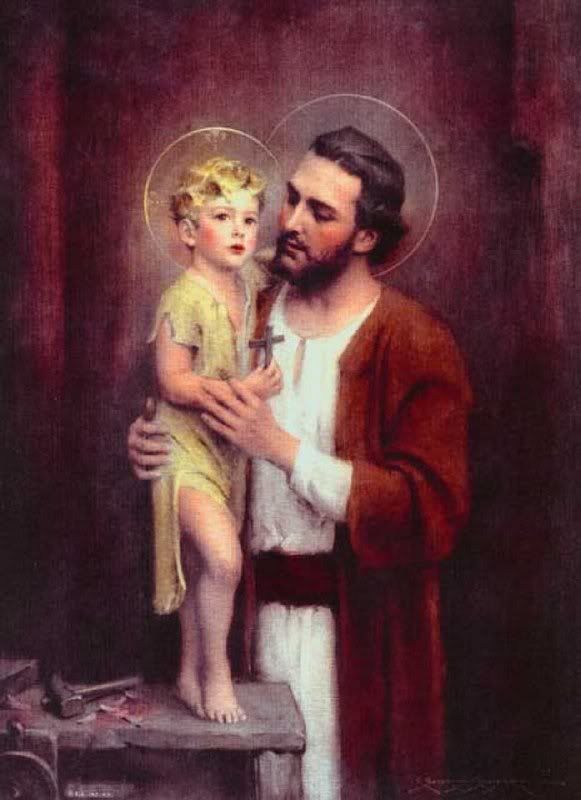
Litany of Saint Joseph
Lord, have mercy on us.
Christ, have mercy on us.
Lord, have mercy on us.
Christ, hear us.
Christ, graciously hear us.
God, the Father of Heaven,
Have mercy on us.
God the Son, Redeemer of the world,
Have mercy on us.
God the Holy Ghost,
Have mercy on us.
Holy Trinity, one God,
Have mercy on us.
Holy Mary,
Pray for us.
Holy Joseph,
Pray for us.
Noble Son of the House of David,
Pray for us.
Light of the Patriarchs,
Pray for us.
Husband of the Mother of God,
Pray for us.
Chaste Guardian of the Virgin,
Pray for us.
Foster-father of the Son of God,
Pray for us.
Sedulous Defender of Christ,
Pray for us.
Head of the Holy Family,
Pray for us.
Joseph most just,
Pray for us.
Joseph most chaste,
Pray for us.
Joseph most prudent,
Pray for us.
Joseph most valiant,
Pray for us.
Joseph most obedient,
Pray for us.
Joseph most faithful,
Pray for us.
Mirror of patience,
Pray for us.
Lover of poverty,
Pray for us.
Model of all who labor,
Pray for us.
Glory of family life,
Pray for us.
Protector of Virgins,
Pray for us.
Pillar of families,
Pray for us.
Consolation of the afflicted,
Pray for us.
Hope of the sick,
Pray for us.
Patron of the dying,
Pray for us.
Terror of the demons,
Pray for us.
Protector of the holy Church,
Pray for us.
Lamb of God, Who takest away the sins of the world,
have mercy on us.
Lamb of God, Who takest away the sins of the world,
have mercy on us.
Lamb of God, Who takest away the sins of the world,
have mercy on us.
V. He made him master of his house,
R. And ruler of all his possesions.
Let us pray:
O God, Thou wert pleased to choose Saint Joseph as the husband of Mary and the guardian of Thy Son. Grant that, as we venerate him as our protector on earth, we may deserve to have him as our intercessor in heaven. We ask this through Christ our Lord.
Amen.
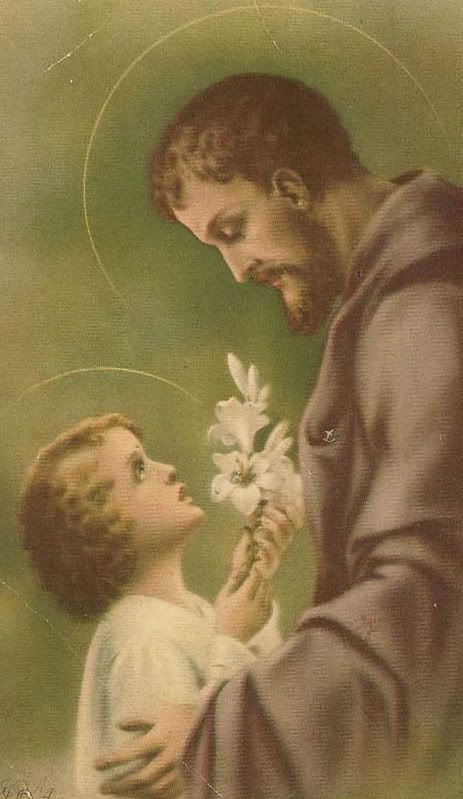
The Extensive Patronage of Saint Joseph

Zeppole di San Guiseppe
Or you can stop in at Maria's Pastry Shop, on Cross Street in Boston's North End for some, if you don't feel like making the pastry yourself.
Or you could just have some Sloppy Joes, I suppose.
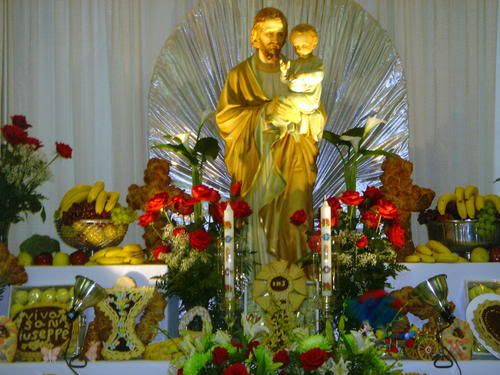
The Sicilian Custom of St. Joseph's Day Altars
And do not forget St. Joseph's vital role as patron of a happy death. Many saints are associated with the deathbed. St. Peter with his binding and loosing powers is popularly said to be the gatekeeper of Heaven. St. Michael has been said to be the escort of the newly departed soul, and the one who protects it from the demons waiting by the deathbed to snatch the soul and drag it to Hell. Our Blessed Lady is, of course, vital here, too (don't forget your daily Three Aves for a Happy and Holy Death). But St. Joseph is a principal patron of the deathbed. Why? Just think: he died in the arms of Jesus and Mary. Who has ever had a happier death than he?
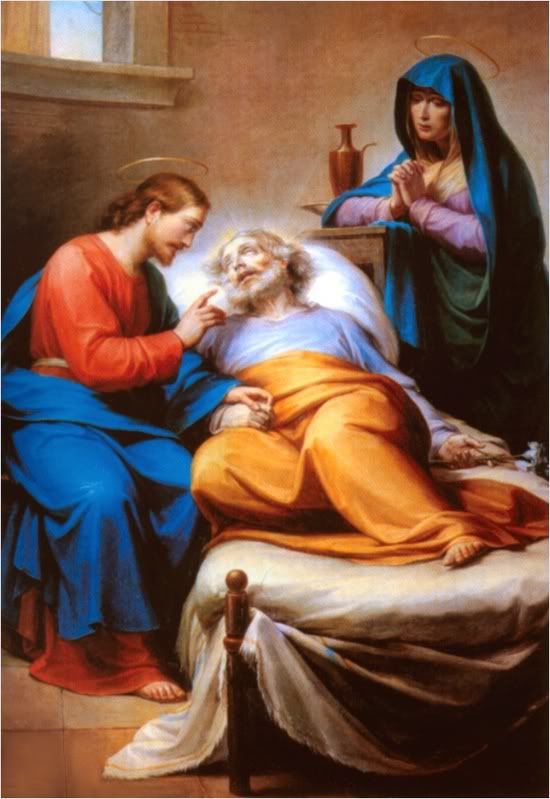
Seems completely unnecessary to me, since the old rule of making Lady Day the Monday after Low Sunday when it falls in Easter Week, and St. Joseph's Day the Tuesday after Low Sunday when it falls in Holy Week is perfectly workable and created no "traffic jam." And then we have Divine Mercy Sunday, Lady Day, and St. Joseph's Day on three consecutive days, which is a wonderful way to honor the Holy Family.

Litany of Saint Joseph
Lord, have mercy on us.
Christ, have mercy on us.
Lord, have mercy on us.
Christ, hear us.
Christ, graciously hear us.
God, the Father of Heaven,
Have mercy on us.
God the Son, Redeemer of the world,
Have mercy on us.
God the Holy Ghost,
Have mercy on us.
Holy Trinity, one God,
Have mercy on us.
Holy Mary,
Pray for us.
Holy Joseph,
Pray for us.
Noble Son of the House of David,
Pray for us.
Light of the Patriarchs,
Pray for us.
Husband of the Mother of God,
Pray for us.
Chaste Guardian of the Virgin,
Pray for us.
Foster-father of the Son of God,
Pray for us.
Sedulous Defender of Christ,
Pray for us.
Head of the Holy Family,
Pray for us.
Joseph most just,
Pray for us.
Joseph most chaste,
Pray for us.
Joseph most prudent,
Pray for us.
Joseph most valiant,
Pray for us.
Joseph most obedient,
Pray for us.
Joseph most faithful,
Pray for us.
Mirror of patience,
Pray for us.
Lover of poverty,
Pray for us.
Model of all who labor,
Pray for us.
Glory of family life,
Pray for us.
Protector of Virgins,
Pray for us.
Pillar of families,
Pray for us.
Consolation of the afflicted,
Pray for us.
Hope of the sick,
Pray for us.
Patron of the dying,
Pray for us.
Terror of the demons,
Pray for us.
Protector of the holy Church,
Pray for us.
Lamb of God, Who takest away the sins of the world,
have mercy on us.
Lamb of God, Who takest away the sins of the world,
have mercy on us.
Lamb of God, Who takest away the sins of the world,
have mercy on us.
V. He made him master of his house,
R. And ruler of all his possesions.
Let us pray:
O God, Thou wert pleased to choose Saint Joseph as the husband of Mary and the guardian of Thy Son. Grant that, as we venerate him as our protector on earth, we may deserve to have him as our intercessor in heaven. We ask this through Christ our Lord.
Amen.

The Extensive Patronage of Saint Joseph

Zeppole di San Guiseppe
Or you can stop in at Maria's Pastry Shop, on Cross Street in Boston's North End for some, if you don't feel like making the pastry yourself.
Or you could just have some Sloppy Joes, I suppose.

The Sicilian Custom of St. Joseph's Day Altars
And do not forget St. Joseph's vital role as patron of a happy death. Many saints are associated with the deathbed. St. Peter with his binding and loosing powers is popularly said to be the gatekeeper of Heaven. St. Michael has been said to be the escort of the newly departed soul, and the one who protects it from the demons waiting by the deathbed to snatch the soul and drag it to Hell. Our Blessed Lady is, of course, vital here, too (don't forget your daily Three Aves for a Happy and Holy Death). But St. Joseph is a principal patron of the deathbed. Why? Just think: he died in the arms of Jesus and Mary. Who has ever had a happier death than he?

Labels: Restorationists
April
Important feasts observed during the month of April include:
1st St. Joseph (transferred from March 19th)
3rd St. Richard of Chichester
4th St. Isidore of Seville
5th St. Vincent Ferrer
7th St. Jean Baptist de la Salle
9th St. Mary of Cleopas
13th St. Pope Martin I (martyr) and Bl. John Lockwood (martyr)
15th Bl. Damien deVeuster (Father Damien of Molokai)
16th Martyrs of Saragossa
20th St. John Payne and Bl. Francis Page and John Finch (martyrs)
21st St. Anselm of Canterbury
23rd St. George (martyr)
24th St. Ives
25th St. Mark the Evangelist
26th Our Lady of Good Counsel and St. Pope Cletus
27th St. Zita
28th St. Louis de Montfort, and Saint Paul of the Cross
29th St. Catherine of Siena and St. Peter of Verona (martyr)
The First Friday of the month is Friday, April 4th.
The First Saturday of the month is Saturday April 5th.
The month begins and ends in the liturgical season of Easter. Rogation Monday is Monday, April 28th. Rogation Tuesday is Tuesday, April 29th. Rogation Wednesday is Wednesday, April 30th (Ascension Thursday being Thursday May 1st). The secular holiday of Patriots' Day falls on Monday April 21st in Massachusetts and Maine, honoring the beginning of the American War of Independence on April 19, 1775.
The intentions of our Holy Father Pope Benedict XVI for the month of April, 2008 are:
General:
That even in difficult and complex situations of present-day society, Christians may never tire of proclaiming with their lives Christ’s resurrection, the source of hope and peace.
Mission:
That future priests in young Churches may be ever more seriously formed culturally and spiritually in order to evangelize their respective countries and the whole world.
Labels: Restorationists
Monday, March 31, 2008
Hock Monday
Normally the return to regular life after the Easter hiatus from work.
Learn more about Hocktide here.
This year, Hocktide is especially joyous because today is also the transferred Lady Day, and tomorrow is also the transferred St. Joseph's feast (the new ordo celebrated him on March 15th, instead of following the tradition of transferring him ahead to the Tuesday after Low Sunday, so this is only traddie St. Joseph's: I hope there are still some good Zeppolle at Maria's!).
Learn more about Hocktide here.
This year, Hocktide is especially joyous because today is also the transferred Lady Day, and tomorrow is also the transferred St. Joseph's feast (the new ordo celebrated him on March 15th, instead of following the tradition of transferring him ahead to the Tuesday after Low Sunday, so this is only traddie St. Joseph's: I hope there are still some good Zeppolle at Maria's!).
Labels: Restorationists
New Traditional Masses In Massachusetts and Connecticut
The Traditional Mass is now offered every Sunday at Noon (I believe, check to be sure about that time) in Enfield, Connecticut, at St. Martha's Parish by Father J. Daniel McElheron. Father, who is the new administrator, and soon to be named pastor of the parish, began saying the Mass there on Easter Sunday. He has said the TLM in New Britain at Saint Mary's, and at Sacred Heart in New Haven.
and
The Tridentine Latin (Low) Mass will be offered in Woburn, MA regularly,
First Saturdays at 9 A.M. at St. Barbara's Parish, 138 Cambridge
Road. Low masses are always dedicated to the Blessed Mother, ending with Hail Marys and Salve Regina. Fr. William Sullivan is quite brave to do this, so if you are able, please attend to show support.
Directions: Take Rte. 128 to exit 33 (Rte 3 south) to fourth
traffic light.
It grows!
and
The Tridentine Latin (Low) Mass will be offered in Woburn, MA regularly,
First Saturdays at 9 A.M. at St. Barbara's Parish, 138 Cambridge
Road. Low masses are always dedicated to the Blessed Mother, ending with Hail Marys and Salve Regina. Fr. William Sullivan is quite brave to do this, so if you are able, please attend to show support.
Directions: Take Rte. 128 to exit 33 (Rte 3 south) to fourth
traffic light.
It grows!
Labels: Restorationists
Lady Day (Feast of the Annunciation)
Last year, I did this with the Angelus, but that was during Lent. This year, Lady Day is transferred to what would otherwise be Hock Monday, or the Monday after Low Sunday, so we are in Easter time, when the Angelus is replaced by the Regina Caeli.
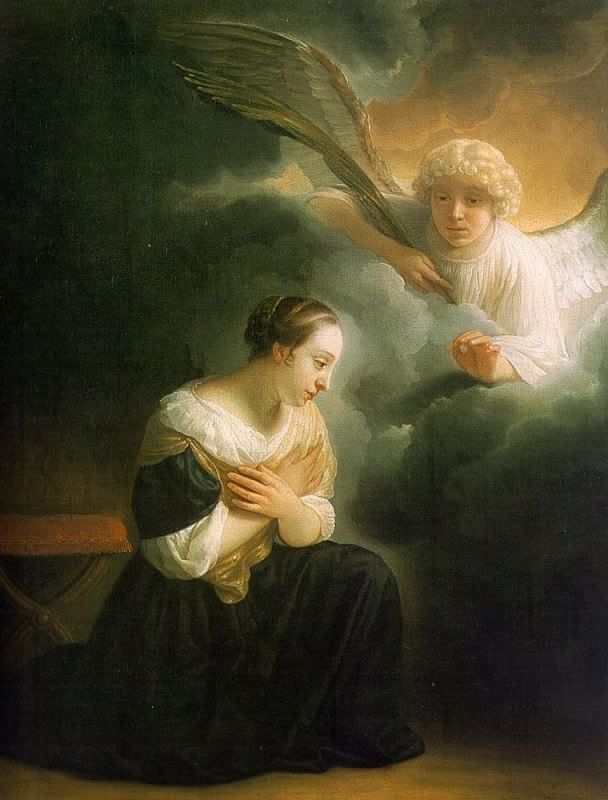
Regina, caeli, laetare, Alleluia:
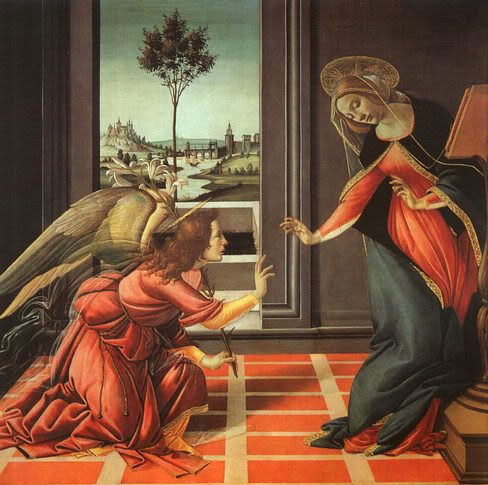
Quia quem meruisti portare, Alleluia,
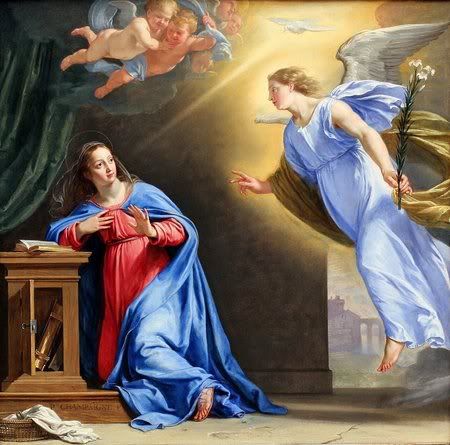
Resurrexit sicut dixit, Alleluia.
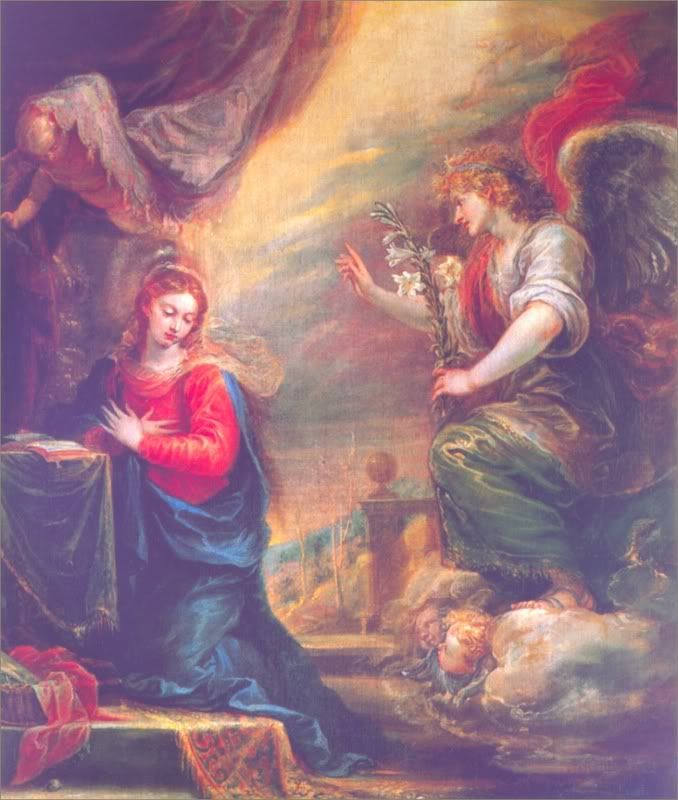
Ora pro nobis Deum, Alleluia.
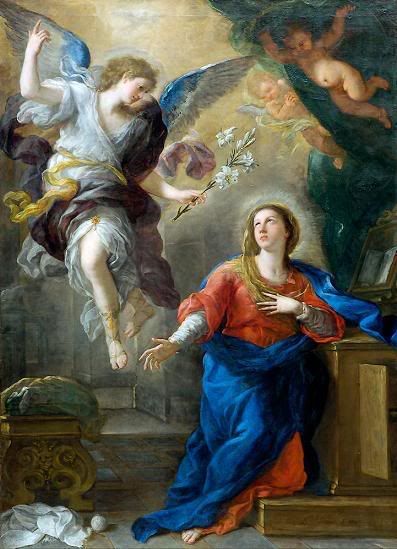
V. Gaude et laetare, Virgo Maria, Alleluia,
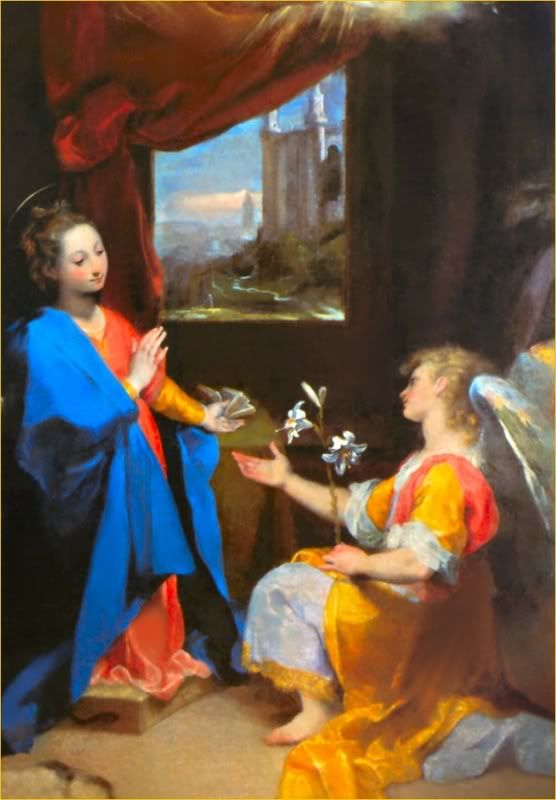
R. Quia surrexit Dominus vere, Alleluia.
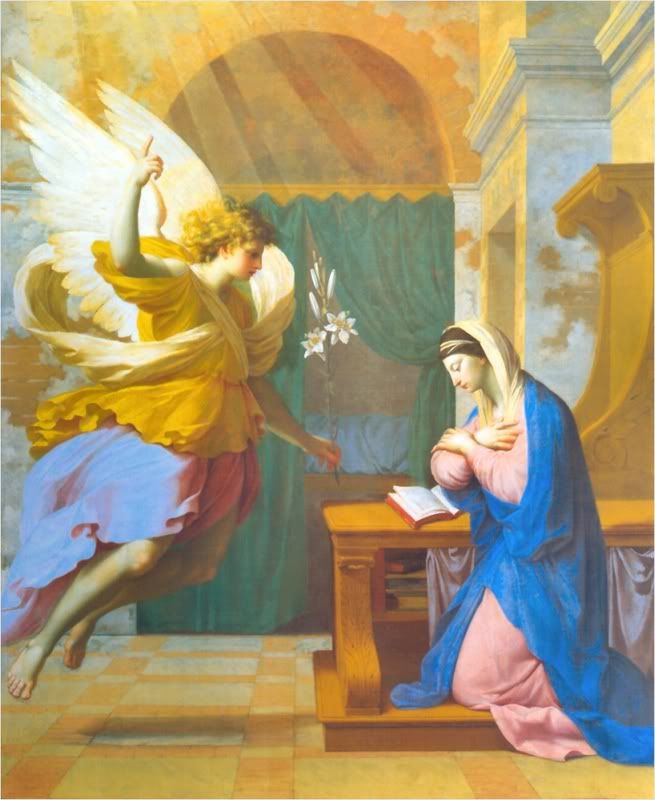
Oremus
Deus, qui per resurrectionem Filii tui, Domini nostri Iesu Christi, mundum laetificare dignatus es: praesta, quaesumus; ut, per eius Genetricem
Virginem Mariam, perpetuae capiamus gaudia vitae.
Per eundem Christum Dominum nostrum.
Amen.
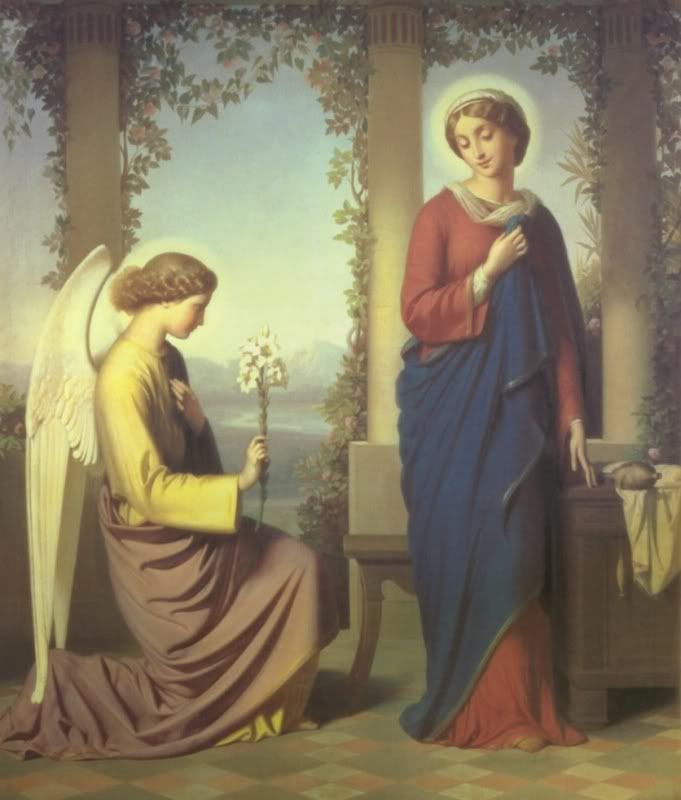

Regina, caeli, laetare, Alleluia:

Quia quem meruisti portare, Alleluia,

Resurrexit sicut dixit, Alleluia.

Ora pro nobis Deum, Alleluia.

V. Gaude et laetare, Virgo Maria, Alleluia,

R. Quia surrexit Dominus vere, Alleluia.

Oremus
Deus, qui per resurrectionem Filii tui, Domini nostri Iesu Christi, mundum laetificare dignatus es: praesta, quaesumus; ut, per eius Genetricem
Virginem Mariam, perpetuae capiamus gaudia vitae.
Per eundem Christum Dominum nostrum.
Amen.

Labels: Restorationists
Sunday, March 30, 2008
Low Sunday/Divine Mercy Sunday

From The Liturgical Year, by Abbot Prosper Gueranger, OSB:
Our neophytes closed the Octave of the Resurrection yesterday. They were before us in receiving the admirable mystery; their solemnity would finish earlier than ours. This, then, is the eighth day for us who kept the Pasch on the Sunday, and did not anticipate it on the vigil. It reminds us of all the glory and joy of that feast of feasts, which united the whole of Christendom in one common feeling of triumph. It is the day of light, which takes the place of the Jewish Sabbath. Henceforth, the first day of the week is to be kept holy. Twice has the Son of God honoured it with the manifestation of his almighty power. The Pasch, therefore, is always to be celebrated on the Sunday; and thus every Sunday becomes a sort of Paschal feast, as we have already explained in the Mystery of Easter.
Our risen Jesus gave an additional proof that he wished the Sunday to be, henceforth, the privileged day. He reserved the second visit he intended to pay to all his disciples for this the eighth day since his Resurrection. During the previous days, he has left Thomas a prey to doubt; but to-day he shows himself to this Apostle, as well as to the others, and obliges him, by irresistible evidence, to lay aside his incredulity. Thus does our Saviour again honour the Sunday. The Holy Ghost will come down from heaven upon this same day of the week, making it the commencement of the Christian Church: Pentecost will complete the glory of this favoured day.
Jesus' apparition to the eleven, and the victory he gains over the incredulous Thomas—these are the special subjects the Church brings before us to-day.
By this apparition, which is the seventh since his Resurrection, our Saviour wins the perfect faith of his disciples. It is impossible not to recognize God in the patience, the majesty, and the charity of him who shows himself to them. Here, again, our human thoughts are disconcerted; we should have thought this delay excessive; it would have seemed to us that our Lord ought to have at once either removed the sinful doubt from Thomas's mind, or punished him for his disbelief. But no: Jesus is infinite wisdom, and infinite goodness. In his wisdom, he makes this tardy acknowledgement of Thomas become a new argument of the truth of the Resurrection; in his goodness, he brings the heart of the incredulous disciple to repentance, humility, and love; yea, to a fervent and solemn retractation of all his disbelief. We will not here attempt to describe this admirable scene, which holy Church is about to bring before us. We will select, for our to-day's instruction, the important lesson given by Jesus to his disciple, and through him to us all. It is the leading instruction of the Sunday, the Octave of the Pasch, and it behooves us not to pass it by, for, more than any other, it tells us the leading characteristic of a Christian, shows us the cause of our being so listless in God's service, and points out to us the remedy for our spiritual ailments.
Jesus says to Thomas: 'Because thou hast seen me, thou hast believed: blessed are they that have not seen, and have believed!' Such is the great truth, spoken by the lips of the God-Man: it is a most important counsel, given, not only to Thomas, but to all who would serve God and secure their salvation. What is it that Jesus asks of his disciple? Has he not heard him make profession that now, at last, he firmly believes? After all, was there any great fault in Thomas's insisting on having experimental evidence before believing in so extraordinary a miracle as the Resurrection? Was he obliged to trust to the testimony of Peter and the others, under penalty of offending his divine Master?
Did he not evince his prudence, by withholding his assent until he had additional proofs of the truth of what his brethren told him? Yes, Thomas was a circumspect and prudent man, and one that was slow to believe what he had heard; he was worthy to be taken as a model by those Christians who reason and sit in judgment upon matters of faith. And yet, listen to the reproach made him by Jesus. It is merciful, and withal so severe! Jesus has so far condescended to the weakness of his disciple as to accept the condition on which alone he declares that he will believe: now that the disciple stands trembling before his risen Lord, and exclaims, in the earnestness of faith, `My Lord and my God!' oh! see how Jesus chides him! This stubbornness, this incredulity, deserves a punishment: the punishment is, to have these words said to him: `Thomas! thou hast believed, because thou hast seen!'
Then was Thomas obliged to believe before having seen? Yes, undoubtedly. Not only Thomas, but all the Apostles were in duty bound to believe the Resurrection of Jesus even before he showed himself to them. Had they not lived three years with him? Had they not seen him prove himself to be the Messias and the Son of God by the most undeniable miracles? Had he not foretold them that he would rise again on the third day? As to the humiliations and cruelties of his Passion, had he not told them, a short time previous to it, that he was to be seized by the Jews in Jerusalem, and be delivered to the gentiles? that he was to be scourged, spit upon, and put to death?
After all this, they ought to have believed in his triumphant Resurrection, the very first moment they heard of his Body having disappeared. As soon as John had entered the sepulchre, and seen the winding-sheet, he at once ceased to doubt; he believed. But it is seldom that man is so honest as this; he hesitates, and God must make still further advances, if he would have us give our faith! Jesus condescended even to this: he made further advances. He showed himself to Magdalen and her companions, who were not incredulous, but only carried away by natural feeling, though the feeling was one of love for their Master.
When the Apostles heard their account of what had happened, they treated them as women whose imagination had got the better of their judgment. Jesus had to come in person: he showed himself to these obstinate men, whose pride made them forget all that he had said and done, sufficient indeed to make them believe in his Resurrection. Yes, it was pride; for faith has no other obstacle than this. If man were humble, he would have faith enough to move mountains.
To return to our Apostle. Thomas had heard Magdalen, and he despised her testimony; he had heard Peter, and he objected to his authority; he had heard the rest of his fellow-Apostles and the two disciples of Emmaus, and no, he would not give up his own opinion. How many there are among us who are like him in this! We never think of doubting what is told us by a truthful and disinterested witness, unless the subject touch upon the supernatural; and then we have a hundred difficulties. It is one of the sad consequences left in us by original sin.
Like Thomas, we would see the thing ourselves: and that alone is enough to keep us from the fulness of the truth. We comfort ourselves with the reflection that, after all, we are disciples of Christ; as did Thomas, who kept in union with his brother-Apostles, only he shared not their happiness. He saw their happiness, but he considered it to be a weakness of mind, and was glad that he was free from it!
How like this is to our modern rationalistic Catholic! He believes, but it is because his reason almost forces him to believe; he believes with his mind, rather than from his heart. His faith is a scientific deduction, and not a generous longing after God and supernatural truth. Hence how cold and powerless is this faith! how cramped and ashamed! how afraid of believing too much l Unlike the generous unstinted faith of the saints, it is satisfied with fragments of truth, with what the Scripture terms diminished truths. It seems ashamed of itself.
It speaks in a whisper, lest it should be criticized; and when it does venture to make itself heard, it adopts a phraseology which may take off the sound of the divine. As to those miracles which it wishes had never taken place, and which it would have advised God not to work, they are a forbidden subject. The very mention of a miracle, particularly if it have happened in our own times, puts it into a state of nervousness. The lives of the saints, their heroic virtues, their sublime sacrifice -- it has a repugnance to the whole thing! It talks gravely about those who are not of the true religion being unjustly dealt with by the Church in Catholic countries; it asserts that the same liberty ought to be granted to error as to truth; it has very serious doubts whether the world has been a great loser by the secularization of society.
Now it was for the instruction of persons of this class that our Lord spoke those words to Thomas: `Blessed are they who havenot seen, and have believed.' Thomas sinned in not having the readiness of mind to believe. Like him, we also are in danger of sinning, unless our faith have a certain expansiveness, which makes us see everything with the eye of faith, and gives our faith that progress which God recompenses with a super-abundance of light and joy.
Yes, having once become members of the Church, it is our duty to look upon all things from a supernatural point of view. There is no danger of going too far, for we have the teachings of an infallible authority to guide us. `The just man liveth by faith.' Faith is his daily bread. His mere natural life becomes transformed for good and all, if only he be faithful to his Baptism. Could we suppose that the Church, after all her instructions to her neophytes, and after all those sacred rites of their Baptism which are so expressive of the supernatural life, would be satisfied to see them straightway adopt that dangerous system which drives faith into a nook of the heart and understanding and conduct, leaving all the rest to natural principles or instinct? No, it could not be so.
Let us therefore imitate St Thomas in his confession, and acknowledge that hitherto our faith has not been perfect. Let us go to our Jesus, and say to him: `Thou art my Lord and my God! But alas! I have many times thought and acted as though thou wert my Lord and my God in some things, and not in others. Henceforth I will believe without seeing; for I would be of the number of those whom thou callest blessed!'
This Sunday, commonly called with us Low Sunday, has two names assigned to it in the Liturgy: Quasimodo, from the first word of the Introit; and Sunday in albis (or, more explicitly, in albis depositis), because on this day the neophytes assisted at the Church services attired in their ordinary dress. In the Middle Ages it was called Close-Pasch, no doubt in allusion to its being the last day of the Easter Octave. Such is the solemnity of this Sunday that not only is it of Greater Double rite, but no feast, however great, can ever be kept upon it.
At Rome, the Station is in the basilica of St Pancras, on the Aurelian Way. Ancient writers have not mentioned the reason of this Church being chosen for to-day's assembly of the faithful. It may, perhaps, have been on account of the saint's being only fourteen years old when put to death: a circumstance which gave the young martyr a sort of right to have the neophytes round him, now that they were returning to their everyday life.
Mass
The Introit repeats those beautiful words of St Peter, which were addressed, in yesterday's Epistle, to the newly baptized. They are like new-born babes, lovely in their sweet simplicity, and eager to drink from the breasts of their dear mother, the Church, the spiritual milk of faith -- that faith which will make them strong and loyal.
The Apostle St John here tells us the merit and power of faith: it is, says he, a victory, which conquers the world, both the world outside, and the world within us. It is not difficult to understand why this passage from St John's Epistles should have been selected for to-day's Liturgy: it is on account of its being so much in keeping with the Gospel appointed for this Sunday, in which our Lord passes such eulogy upon faith.
If, as the Apostle here assures us, they overcome the world who believe in Christ, that is not sterling faith which allows itself to be intimidated by the world. Let us be proud of our faith, esteeming ourselves happy that we are but little children when there is a question of receiving a divine truth; and let us not be ashamed of our eager readiness to admit the testimony of God. This testimony will make itself heard in our hearts, in proportion to our willingness to hear it. The moment John saw the winding-bands which had shrouded the Body of his Master, he made an act of faith; Thomas, who had stronger testimony than John (for he had the word of the Apostles, assuring him that they had seen their risen Lord), refused to believe: he had not overcome the world and its reasonings, because he had not faith.
The two Alleluia Versicles are formed of two texts alluding to the Resurrection. The second speaks of the scene which took place on this day, in the cenacle.
We have said enough about St Thomas' incredulity; let us now admire his faith. His fault has taught us to examine and condemn our own want of faith; let us learn from his repentance how to become true believers. Our Lord, who had chosen him as one of the pillars of his Church, has been obliged to treat him with an exceptional familiarity: Thomas avails himself of Jesus' permission, puts his finger into the sacred wound, and immediately he sees the sinfulness of his past incredulity.
He would make atonement, by a solemn act of faith, for the sin he has committed in priding himself on being wise and discreet: he cries out, and with all the fervour of faith: My Lord and my God!
Observe, he not only says that Jesus is his Lord, his Master, the same who chose him as one of his disciples: this would not have been faith, for there is no faith where we can see and touch. Had Thomas believed what his brother-Apostles had told him, he would have had faith in the Resurrection; but now he sees, he has experimental knowledge of the great fact; and yet, as our Lord says of him, he has faith. In what? In this, that his Master is God. He sees but the humanity of Jesus, and he at once confesses him to be God. From what is visible, his soul, now generous and repentant, rises to the invisible: `Thou art my God!'
Now, O Thomas! thou art full of faith! The Church proposes thee to us, on thy feast, as an example of faith. The confession thou didst make on this day is worthy to be compared with that which Peter made, when he said: `Thou art Christ, the Son of the living God!'
By this profession, which neither flesh nor blood had revealed to him, Peter merited to be made the rock whereon Christ built his Church: thine did more than compensate thy former disbelief; it gave thee, for the time, a superiority over the rest of the Apostles, who, so far at least, were more taken up with the visible glory, than with the invisible divinity, of their risen Lord.
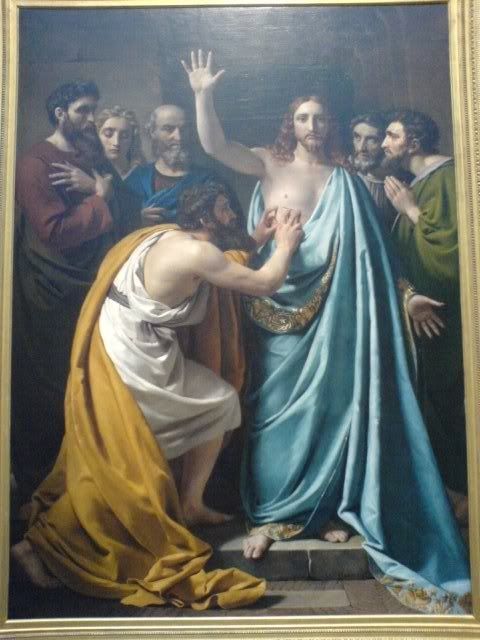
Since the reign of Pope John Paul II, this has been known also as Divine Mercy Sunday, based on the revelations given by Our Lord to Saint Faustina Kowalska.
Learn more about the Divine Mercy devotion here.
Do not overlook the plenary indulgence granted to the faithful on the feast of Divine Mercy.
I am not one of those traddies who scoff at it, in effect because it was the product of Pope John Paul's reign. Whatever their arguments, they would have nothing to criticize about it if it were the product of Pope Pius XII's reign. To me, it has as much validity as the private revelations to Saint Margaret Mary that led to the devotion to the Sacred Heart.
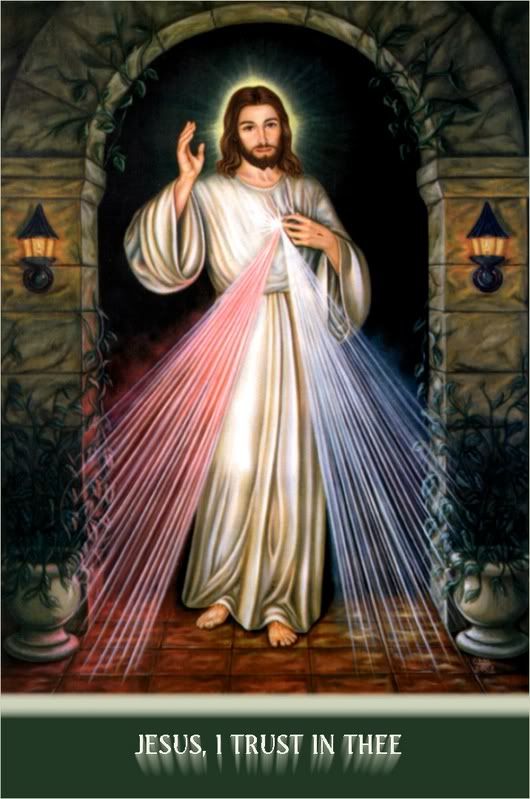
Labels: Restorationists






































































































